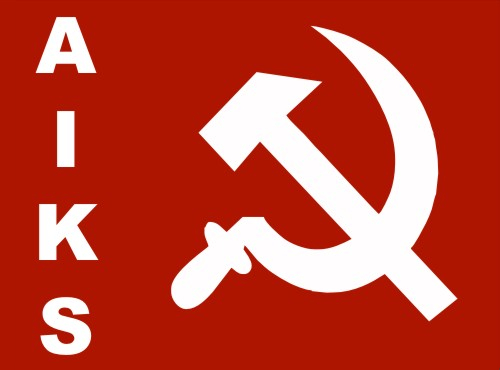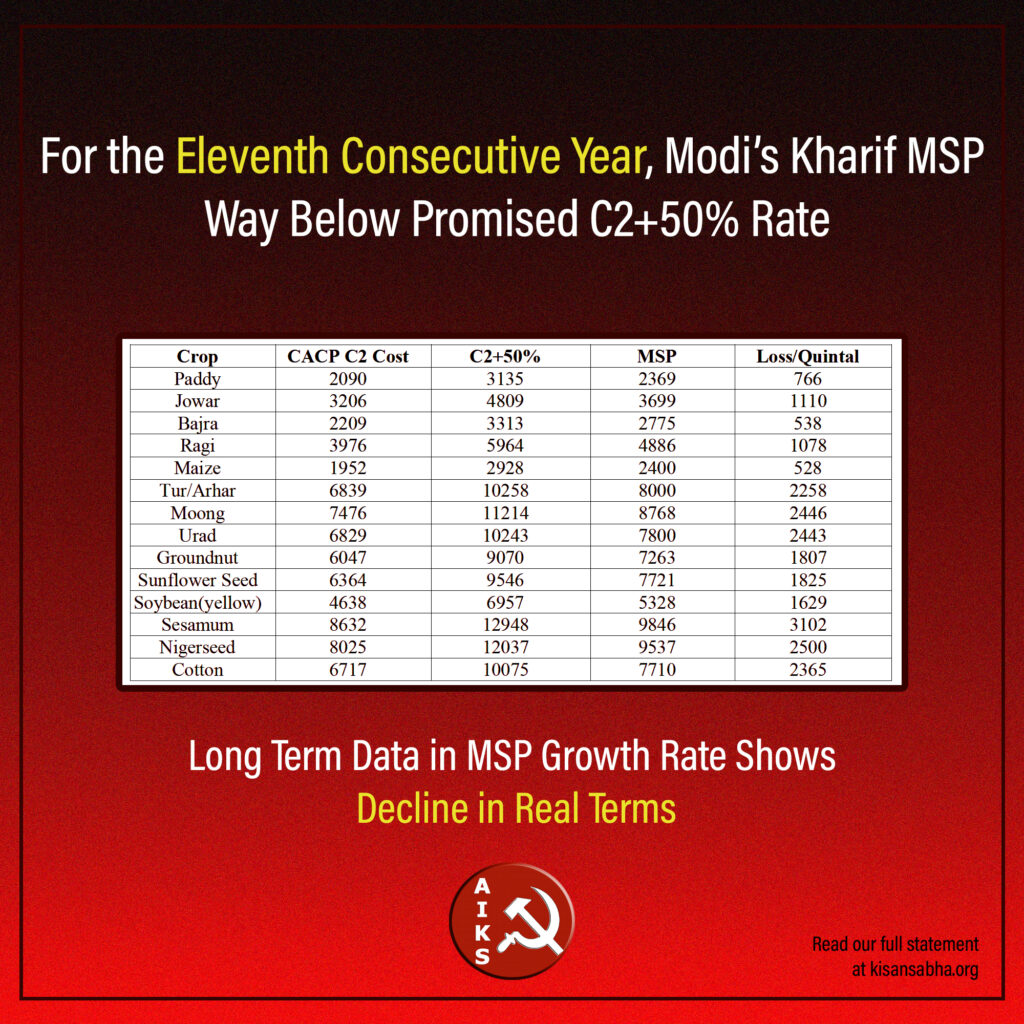Narendra Modi’s Eleven Years of Betrayal: Kharif MSP Way below Promised C2+50%
The Minimum Support Price (MSP) announced for the Kharif season 2025–26 by the BJP led Union Government is yet another betrayal by the Prime Minister Narendra Modi; to be precise for the eleventh Kharif in a row. The BJP Government has made tall claims that it has given a major boost to farmers by approving a MSP package worth Rs 2.07 lakh crore for the Kharif season of 2025-26. The corporate media has immediately joined the bandwagon and parroted the claim that the new MSP ensures at least 50 per cent profit over the cost of production. In reality this claim is far removed from the truth. The BJP Government has indulged in a jugglery of numbers and distorted data to wilfully mislead the public.
The National Commission of Farmers headed by Dr. M.S. Swaminathan clearly stated in its 2006 Report that in order to rescue farmers from the agrarian crisis, they must be paid a remunerative price at least 50% above the comprehensive cost of cultivation C2. However, even after 19 years, they remain hollow promises. Even the MSP announced remains mostly on paper since there is no assured procurement. There exists a substantial gap between the announced MSP and price realised by farmers. The cost of cultivation surveys shows that the average price received by paddy farmers was 36% lower than the MSP@ A2+FL in 2021-22 (the latest data ava). The average price received by Tur/Arhar farmers in Telengana was 11% lower than the MSP in 2021-22. This implies that the benefit of MSP is not reaching to most of the farmers. The long-term data on MSP released by the Ministry of Agriculture shows a deceleration in the growth of real MSP for almost all crops, particularly paddy. For example, the real MSP for paddy grew at an annual rate of 1.17% per annum between 2004–05 and 2013–14, which declined to 0.53% per annum during the period from 2014–15 to 2025–26. Out of the 16 crops studied, 9 crops showed a sharp slowdown in real MSP growth between 2014–15 to 2025–26. For crops such as Paddy, Maize, Tur/Arhar, urad, and groundnut, the growth rate in the last decade was less than 1% per annum.
The Government’s Press Release has remained almost silent about paddy, the most important Kharif crop as the inconvenient truth is that its MSP has been increased by a mere ₹69 per quintal. According to the national average cost projected by CACP, the C2+50% price for paddy comes to ₹3,135 per quintal, but the declared MSP is only ₹2,369, which means a loss of ₹766 per quintal. If we look at the cost projected by the states for paddy, it is ₹2787 in Punjab, ₹3673 in Telangana and Rs.4159 in Maharashtra per quintal. These states had recommended MSPs of ₹4,281, ₹5,510, and ₹4,783 per quintal respectively. This clearly shows that in many states, even according to government figures, farmers will struggle to recover their cost of production from paddy crop sales. According to the CACP, across India merely 17.3 per cent of paddy farmers have benefited from procurement at MSP in 2023-24. The paddy procurement at MSP was very meagre in BJP-NDA ruled States like Uttar Pradesh (5.8%), Bihar (4.1%), Assam (below 5%) and Congress ruled Karnataka, JMM ruled Jharkhand procuring from less than 5 per cent of the paddy farmers. Most States also had mentioned costs to be higher than the CACP cost estimates. Drawing on data from Agricultural Statistics at a Glance for 2023–24 agricultural year, clearly there is a lack of alignment between procurement levels and the increase in MSP. Only 0.23 per cent of Tur/Arhar production, 0.72 percent of Groundnut production, and 9.3 per cent of Cotton production was procured.
The government made exaggerated claim that the MSP has been increased by ₹820 for Nigerseed, ₹596 for Ragi, ₹589 for Cotton, and ₹579 for Sesamum per quintal. But even these increased prices fall far short of the C2+50% benchmark, and farmers will have to bear heavy losses. The MSP for Nigerseed has been fixed at ₹9,537 per quintal, while the C2+50% price should be ₹12,037 — meaning a loss of ₹2,500 per quintal for the farmer. Similarly, in the case of Ragi, the government has fixed the MSP at ₹4,886 per quintal, but the C2+50% price, as per CACP’s projections, should be ₹5,964 — which means the farmer will get ₹1,078 less per quintal than the C2+50% price. Looking at the figures for cotton, the C2+50% price is ₹10,075 per quintal, whereas the government has announced an MSP of only ₹7,710 — compelling the farmer to sell the crop at a loss of ₹2,365 per quintal. It is notable that the Telangana Government had in 2024-25 demanded ₹16,000 per quintal. In Sesamum, the C2+50% price should be ₹12,948, but the government has declared an MSP of ₹9,537 — resulting in a loss of ₹3,102 per quintal for the farmer.
In Jowar (sorghum), the government-declared MSP is ₹3,699 per quintal, but the C2+50% cost, as per CACP, is ₹4,809 — which means the farmer will receive ₹1,110 less per quintal. Not only this, the CACP-projected cost for Karnataka is ₹3,802, and the state’s projected cost is ₹5,232 per quintal, while Maharashtra’s projected cost is ₹4,163 — meaning that in these states, the income from crop sales will not even cover the cost of cultivation. The same situation prevails in the case of Bajra (pearl millet) and Maize. The MSP for Bajra has been set at ₹2,775 and for Maize at ₹2,400 per quintal, whereas the C2+50% cost based on CACP’s projections is ₹3,313 and ₹2,928 respectively. Even in Gujarat — Prime Minister Narendra Modi’s home state — the state government has projected the cost of production for Maize at ₹2,991 and suggested an MSP of ₹4,550. This means that if a Gujarati farmer sells Maize at the Centre’s MSP, he will receive ₹591 less than his cost of production.
Even the above losses to farmers are based on government-projected costs. The truth, which everyone knows, is that the actual cost of production is much higher than the cost projected by the CACP. The continuously rising input costs are increasing the farmers’ expenses, but they are not receiving a fair price for their produce. This is the reason behind the prevailing agrarian crisis and the ongoing farmers’ suicides in the country.
The All India Kisan Sabha warns the BJP-led Union government to desist from data manipulation and refrain from misleading the public. AIKS calls upon all its units to expose the farcical claims. AIKS will unite with farmers’ organisations to launch a fierce movement demanding fair price for crops.
Sd/-
Ashok Dhawale
President
Vijoo Krishnan
General Secretary


